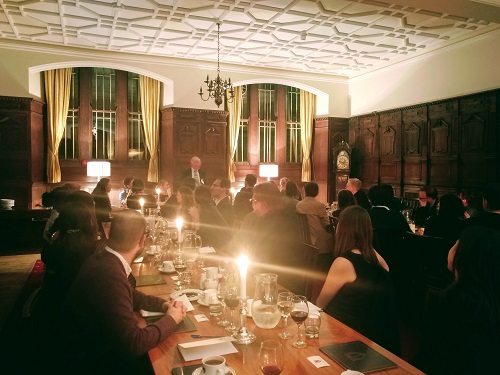Three doctoral students to connect their research with the political future of Europe
UPF doctoral students Mladen Grgic and Cristina Guerri-Fernandez (Law), along with Gerard Llorens de Cesaris (History), are among the thirty researchers selected to participate in the first edition of the Europaeum Scholars programme, which aims to train future leaders during a period of two years.
Three UPF doctoral students have started their participation in the first edition of the Europaeum Scholars programme, promoted by the Europaeum association to which the University belongs.
 This initiative aims to tackle the major political and social problems in Europe based on proposals put forward by young researchers in the fields of the humanities and social sciences at outstanding universities in the EU.
This initiative aims to tackle the major political and social problems in Europe based on proposals put forward by young researchers in the fields of the humanities and social sciences at outstanding universities in the EU.
Postgraduate students Mladen Grgic and Cristina Güerri-Ferrández (doctorates in Law), along with Gerard Llorens De Cesaris (doctorate in History), are among the thirty young people chosen to take part in this two-year programme, with headquarters in Geneva, Leiden, Oxford and Prague. On 2 January 2018, all participants met to hold an initial meeting, in the course of a soirée that took place at the University of Oxford, the coordinating centre.
The thirty postgraduate students come from thirteen of the EU’s elite universities: Luxembourg, Leiden, the Ludwing-Maximilian in Munich, the Panthéon-Sorbonne (Paris 1) and the Free University of Brussels, St Andrews, the Graduate Institute of Geneva, the Complutense of Madrid, Oxford, the Jagiellonski of Krakow, the Institute for Political Studies of the Catholic University of Portugal, the Charles of Prague, and Helsinki. After Oxford, with four representatives, Pompeu Fabra University is the university with most members, along with Munich, St. Andrews and the Graduate Institute of Geneva, all of them with three members.
A training programme that aims to provide solutions to the future of Europe
The Europaeum Scholars Programme consists of four modules for each of the two years of duration (eight modules in all), the first of which has already been carried out at the University of Oxford during the first week of January 2018. The approach focuses on four areas of crucial importance for the future of Europe: identity, inclusion, sustainability, and growth and development.
The participants, who are divided into working groups that focus on specific problems, will be part of a network with some of the brightest people of their generation, interested in shaping the future of Europe. They will connect their doctoral research with the world of public policymaking, taking advantage of the combined resources of the member universities of the Europaeum network.
They will be able to visit academic institutions, find out how they operate, through training sessions and meetings with political scholars, leaders, professionals and policy makers, in order to tackle Europe’s major political, social and cultural challenges. They will visit at least three European universities, in addition to their own; they will be part of a multidisciplinary team, and develop basic skills for a successful career in both the public and the private sectors.
Andrew Graham, executive chairman of Europaeum, highlights some of the key points of the pilot programme now getting under way, arising from Brexit and all the doubts it implies: the fact that European problems are analysed, not only of the EU or the Eurozone; the results must be significant policy initiatives; the proposals will have to be able to be implemented in some way, and must be useful, interest the people, and offer solutions.
According to the rules of the programme, those selected are people who “think for themselves but not only for themselves”. The selection criteria valued students with an outstanding academic record, with a perfect knowledge of English, and also took into account their personal values and their commitment to Europe.
The three UPF doctoral students selected
Gerard Llorens de Cesaris, reading History, is researching into “Spain and the United States, an Atlantic history. 1868-1874”. With a bachelor’s degree in Humanities and a master’s degree in World History by UPF, his main topic of interest is 19th-century Spanish and Atlantic history, focusing especially on issues of slavery, citizenship and republicanism.
Cristina Guerri-Fernández, reading Law (specializing in Criminology), is doing research into “Prison officials and the quality of prison life in Catalan prisons”. She has a bachelor’s degree in Criminology and Public Prevention Policies (Graduation Special Award 2013-2014) and an interuniversity master’s degree in Criminology and the Criminal Justice System at UPF and currently enjoys a University Teacher Training scholarship (FPU).
Mladen Grgic, reading Law, is studying “Chinese infrastructure investment in the Balkans”. Specifically, he is studying how these investments affect the political and economic paths of the region and their impact on the processes of democratization and integration in the EU. He has a bachelor’s degree in Political Sciences, International Relations and European Studies by the University of Bari, he won a Fulbright scholarship to the East Asian Institute of the University of California, Berkeley (USA).
